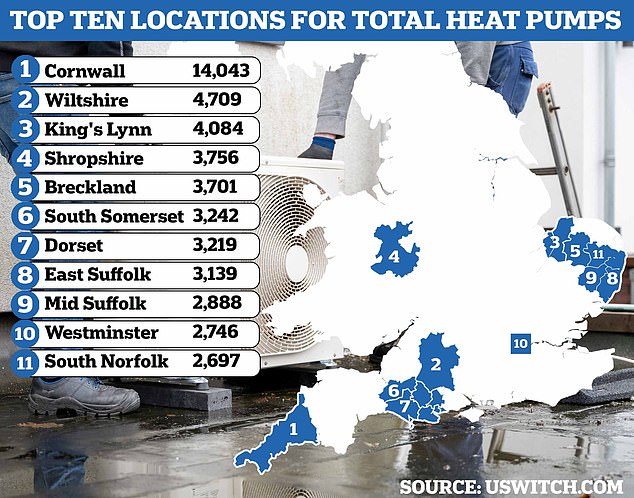- Some regions have taken to heat pumps more than others, new figures reveal
The regions of the UK with the most – and least – heat pumps have been revealed.
The number of the devices installed by in the UK has been increasing in recent years, as households attempt to reduce their carbon emissions and cut their energy costs.
Heat pumps use electricity to transfer heat from the air or ground into buildings for heating, and are an alternative to traditional gas boilers.
With the cost-of-living crisis taking a bite out of home budgets, half of UK households (49 per cent) say they have embraced green habits mostly to save money – though at £8,000 or more, the upfront cost of a heat pump is a barrier.

Southern bias: Most heat pumps are located in the South or East of England
Cornwall is the heat pump capital of the UK, with 14,043 homes using the technology, according to analysis of 26 million homes by comparison firm Uswitch.
The South West region boasts 11,980 air source heat pumps and 14,043 ground source heat pumps, meaning that more than 5 per cent of the 277,078 households have adopted the technology.
Widespread adoption has been slow in the UK due to a range of factors including high installation costs compared to gas boilers, and being better suited to newer homes which are well-insulated and airtight – rather than much of the UK’s older, draughtier housing stock.
A dearth of skilled installers and lack of consumer knowledge are also reasons for the slow update in the UK.
> Are all heat pumps noisy? I spent a week with one and it drove me mad
A household replacing a gas boiler with a ground source heat pump could potentially reduce their energy bills by up to 50 per cent.
Achieving these savings would need the heat pump to be installed to very high standards, for the efficiency of the heat pump to be high and the household to be on a heat pump tariff.
Across the UK, only 1 per cent of homes have installed heat pumps, with 228,877 air source heat pumps and 32,174 ground source varieties in action.

Slow adopters: These areas have the fewest homeowners who have installed heat pumps
Wiltshire has the second most heat pumps, with 4,709 among the 209,052 households in the region. King’s Lynn and West Norfolk, Shropshire, and Breckland, Norfolk, make up the rest of the top five.
Mid Suffolk has the highest proportion of heat pumps in homes, with 6.8 per cent of the 42,211 households in the region having one. Blackpool has the lowest proportion, with only 0.1 per cent of the area’s 82,785 homes investing in the technology.
Tamworth in Staffordshire is the region with the fewest heat pumps, with only 20 in total. Hyndburn and Barrow-in-Furness have the next lowest number, with 24 and 27 respectively.
Uswitch energy expert Ben Gallizzi said: ‘Heat pumps have been slow to spread across the UK so far, with their widespread adoption being held back by high installation costs and poorly insulated housing.
‘There are varying types of heat pump, including air or ground, and some can be pricey – and disruptive – to install.
‘Although they can reduce your energy bill if they are well-installed, the amount they will save you is difficult to predict as it depends on what system they are replacing.
‘If you’re replacing a standard gas boiler, a heat pump may be less likely to offer savings, though it will drastically cut your carbon emissions.’
SAVE MONEY, MAKE MONEY

3.75% AER Var.

3.75% AER Var.
Chase current account required*

4.91% 6 month fix

4.91% 6 month fix
Prosper rate boost on GB Bank

Free share offer

Free share offer
No account fee and free share dealing

4.84% cash Isa

4.84% cash Isa
Flexible Isa that now accepts transfers

Dealing fee refund

Dealing fee refund
Get £200 back in trading fees
Affiliate links: If you take out a product This is Money may earn a commission. These deals are chosen by our editorial team, as we think they are worth highlighting. This does not affect our editorial independence. *Chase: 3.69% gross. Ts and Cs apply. 18+, UK residents
This article was originally published by a www.dailymail.co.uk . Read the Original article here. .


